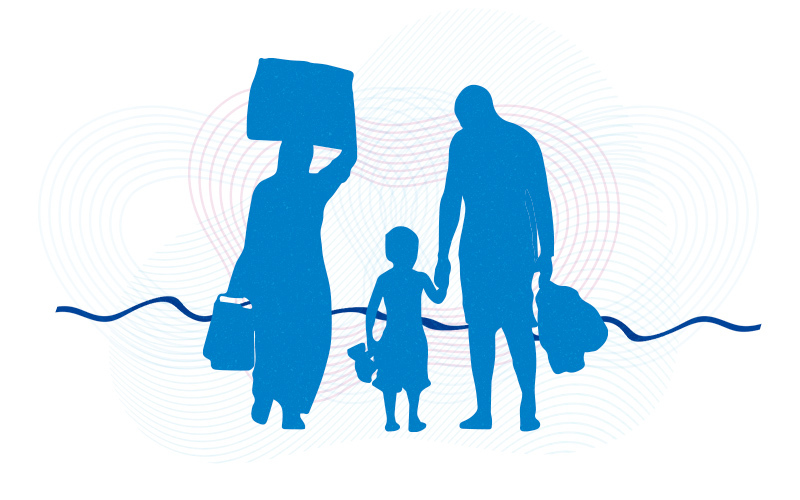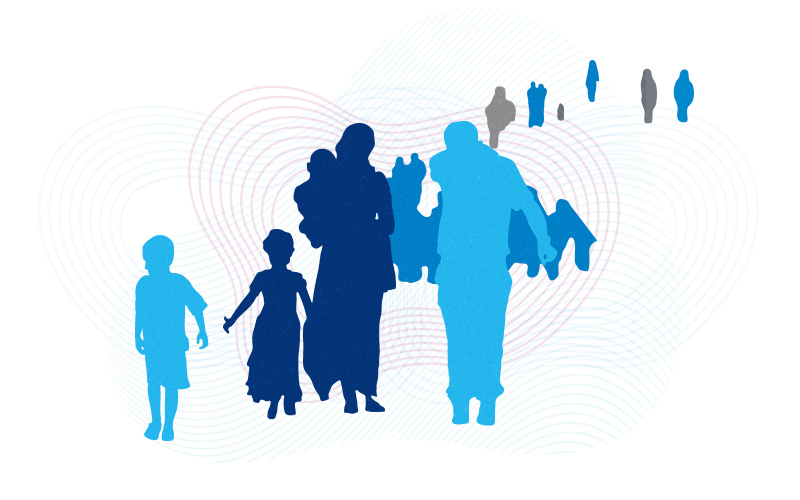Providing culturally responsive care to refugee and immigrant families

Refugee and immigrant parents and children have unique care needs. They have left their former lives behind, often due to discrimination, poverty, violence, or even ethnic cleansing operations. They may have witnessed or experienced torture or the death of a loved one. Once resettled in the U.S., parents must navigate and adjust to American culture, often in isolation. Families may face additional discrimination and hate, and some fear deportation. Many struggle with mental health issues, yet few seek mental health care.
Through its refugee program, the Trauma and Community Resilience Center at Boston Children’s Hospital works with immigrant and refugee families to support their healthy adjustment. The Center also helps mental health and medical professionals engage and serve these communities to provide effective, culturally responsive care.
In this four-part podcast series, Center experts Luna Mulder, PsyD, Jeffrey Winer, PhD, Osob Issa, MSW, Emma Cardeli, PhD, and Alisa Miller, PhD and their colleagues tackle the challenges of working with immigrant and refugee parents and children. They encourage professionals to understand their own cultural biases and how these can affect care. The series also suggests parenting and coping strategies that meet families where they are.
While the series focuses on parenting and mental health, it offers valuable wisdom for any health care provider working with the immigrants or refugees.
Key points discussed:
Your beliefs and attitudes toward parenting and mental health are influenced by culture.
These beliefs and values may differ from those of the refugee and immigrant families in your care. For example, the dominant American culture is individualistic, whereas many other cultures are more collectivistic. Reflecting on your own biases, blind spots, and position of privilege is important.
Cultural competency and humility will help you connect with patients and their families.
Well-meaning clinicians may deliver care or advice that doesn’t make sense for an immigrant or refugee family. Learning about a family’s culture and the events that led to their migration communicates awareness. It also helps build trust, as does curbing the temptation to judge and being mindful of power imbalances in the health care setting.
Culture influences how families perceive and talk about trauma and mental illness.
Many languages lack vocabulary for depression and anxiety. Families often express Mental health symptoms through somatic complaints such as headaches or backaches. In children, psychological distress may be seen as behavior problems, and parents might expect clinicians to simply tell their child to stop the problematic behaviors.

Culture affects parenting.
Parenting strategies that American clinicians recommend may not make sense to families who have experienced displacement and trauma, or have a different cultural frame of reference or values. For example, refugee and immigrant parents may worry about their children, especially girls, becoming too “Westernized.”
Experience of trauma affects parenting.
A past experience of trauma can change how parents set limits, how they ask for help, and how much hope they place in mental health or other services. Refugee and immigrant parents may place all their hopes in their children’s future and therefore be disheartened if a child isn’t doing well in school. Past trauma can also overwhelm a parent’s own ability to cope.
Resettlement and acculturation can change family dynamics.
Refugee and immigrant parents may feel isolated. They often lack access to former support systems that provide a sense of belonging and understanding of their cultural norms. In contrast, their children are exposed to American culture at school and often quickly adapt. This difference in adjustment can lead to an acculturation gap (along with a generational gap) and make parents feel disconnected from their children.
Most families are resilient.
The good news is that not all immigrants and refugees who experience trauma develop mental health issues like post-traumatic stress disorder: About 15 to 40 percent do. A strong sense of family responsibility and striving toward a better life sustain most parents. Health care providers can help parents build on the resilience that brought them here to adjust to life in the U.S. and achieve the outcomes they desire for their children.
Learn more about Refugee Trauma & Resilience programs at Boston Children’s Trauma and Community Resilience Center.
Related Posts :
-

Help your child manage anxiety about school violence
With news of school shootings and other violence often reaching children, parents sometimes grapple with how to help their child ...
-

“Observe. Be open.”: How Boston Children’s nurses are changing the future of global health
Ashley Birch, MSN, CPNP, a Boston Children’s pediatric nurse practitioner and Global Nursing fellow, didn’t expect a trash ...
-

Keeping up with the tween skin care trend: What’s in those products?
More teens and tweens are hitting the mall to grab skin-care products they’ve seen on social media — but are ...
-

Making pediatric health equity research truly equitable: An EDI review process
A burgeoning number of studies are examining pediatric health equity, diversity, and inclusion (EDI). But if not done right, health ...





